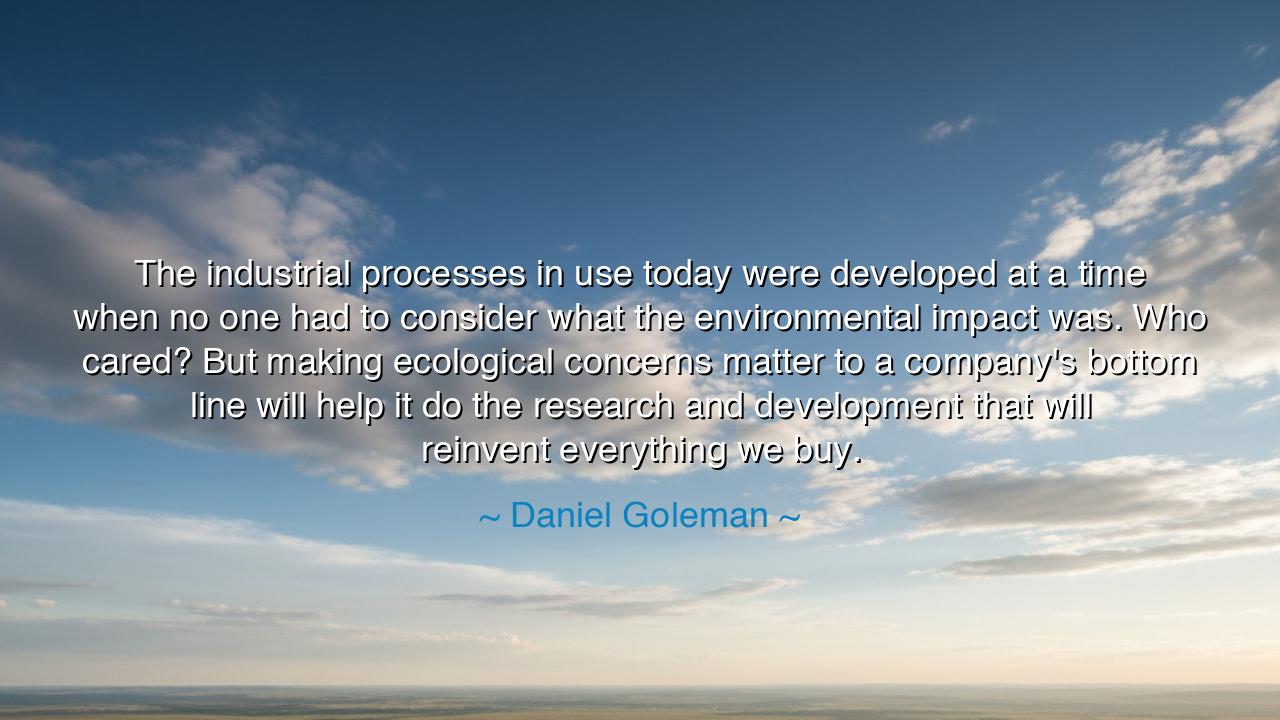
The industrial processes in use today were developed at a time
The industrial processes in use today were developed at a time when no one had to consider what the environmental impact was. Who cared? But making ecological concerns matter to a company's bottom line will help it do the research and development that will reinvent everything we buy.






The words of Daniel Goleman, “The industrial processes in use today were developed at a time when no one had to consider what the environmental impact was. Who cared? But making ecological concerns matter to a company's bottom line will help it do the research and development that will reinvent everything we buy,” are a call both mournful and visionary. They carry the weight of lament for the past, when blind ambition carved prosperity at the expense of the earth, and they carry the fire of hope for the future, when human ingenuity may yet heal what it has harmed. These words remind us that industry, though once heedless, can be transformed into a guardian of life itself if guided by wisdom and necessity.
The origin of this insight rests in the age of industrial expansion, when smoke-filled skies and poisoned rivers were considered the price of progress. In those days, the measure of success was output and profit, not balance with nature. Factories roared, engines burned, and new inventions flooded the world, but the cost was hidden in the suffering of the land, the air, and the seas. Goleman speaks as one who has studied the human mind and the structures of power; he understood that change would not come by moral appeal alone, but by tying ecological concerns to the heart of commerce itself: the bottom line.
History offers us the story of Cuyahoga River in Ohio, a river so polluted with industrial waste that it caught fire multiple times in the twentieth century. The flames upon the water shocked the world, and out of that shock arose the modern environmental movement in America. Laws were written, regulations were born, and businesses, once heedless, began to see that pollution was not only a moral stain but a financial risk. The burning river became a symbol of awakening: that industry, if left unchecked, consumes itself. Goleman’s words echo this lesson—only when consequences touch the survival of the company will it invest in reinventing its ways.
Yet his vision does not stop at warnings. It looks forward to a new age when companies see sustainability not as a burden but as an opportunity. Imagine industries where waste becomes resource, where clean energy fuels invention, and where the making of profit aligns with the healing of earth. Already we see glimpses of this truth: car makers turning to electric vehicles, technology firms reducing carbon footprints, farmers restoring soil with regenerative methods. These are not merely acts of conscience; they are strategies for survival in a marketplace where consumers demand responsibility and where resources grow scarce.
The wisdom of Goleman is this: do not wait for altruism to save the world. Align ecological responsibility with self-interest, and the engines of industry will move with a speed unmatched by any sermon. The same truth has guided humanity before—when navigation became tied to trade, the seas were conquered; when literacy became tied to commerce, printing presses spread. When the survival of industry itself is bound to the survival of the earth, then research and innovation will flow like rivers toward balance.
The lesson for us is clear: as individuals, we hold power, for we are the ones who buy. Each coin spent is a vote cast for the future. If we choose products born of sustainability, if we reward companies that honor the earth, then we help turn ecological concern into a force that drives change. Let us not say, “Who cares?” but rather, “We care,” and let our choices echo in the halls of business.
Practical action lies before us: support companies that reduce waste and pollution, demand transparency in how goods are made, invest in products designed to last rather than to be discarded. In our daily lives, let us remember that industry listens to the chorus of consumers. As the ancients taught, small streams join to form mighty rivers; so too our individual actions join to shape the future of commerce and of the earth itself.
So let Goleman’s words be carried forward: “Making ecological concerns matter to a company’s bottom line will… reinvent everything we buy.” This is not mere theory, but prophecy. It tells us that the same ingenuity that once scarred the world may yet save it, if only guided by wisdom and necessity. Let us be the generation that demands this transformation, so that future children inherit not a burning river, but a living one, and not a barren earth, but a flourishing one.






AAdministratorAdministrator
Welcome, honored guests. Please leave a comment, we will respond soon